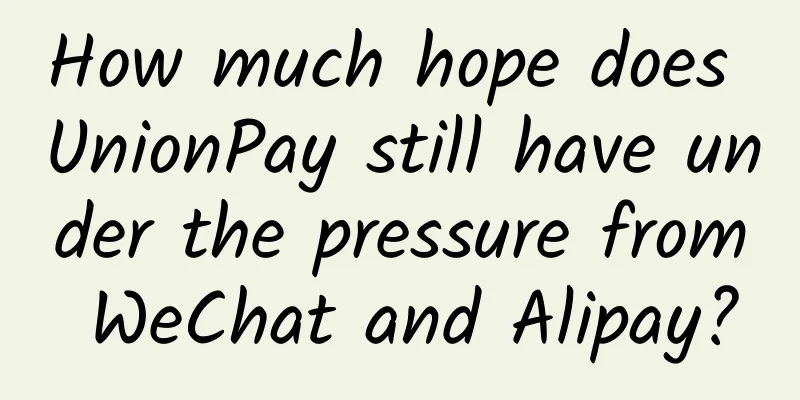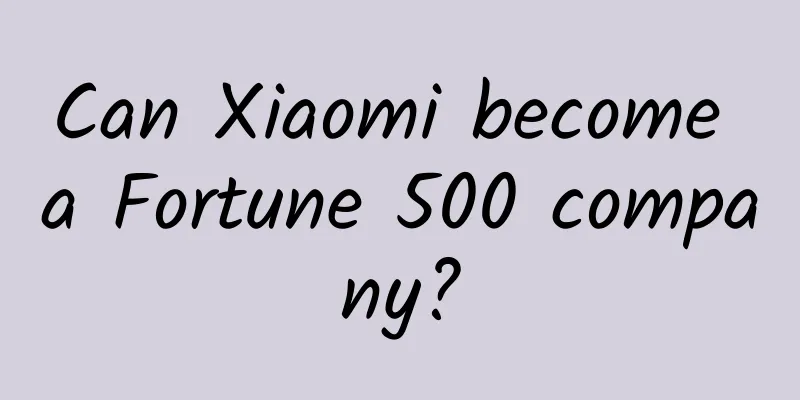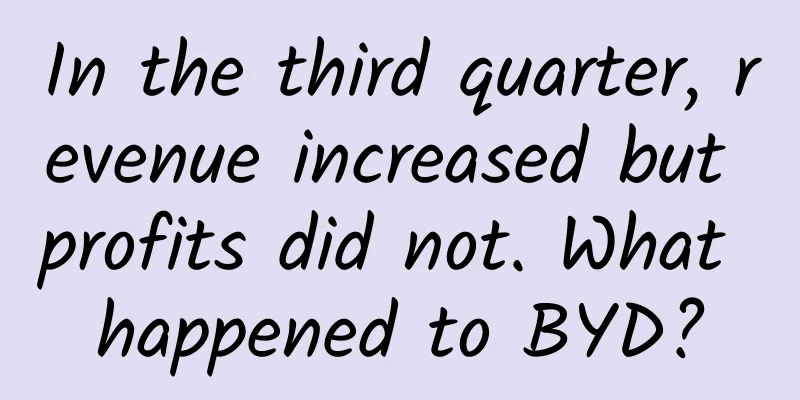How much hope does UnionPay still have under the pressure from WeChat and Alipay?

|
There are also certain opportunities in an oligopoly market. In recent years, with the rapid development of mobile Internet, Alipay and WeChat have risen rapidly relying on QR code payment, causing a huge impact on UnionPay payment and cash payment. Today, Alipay and Tenpay (WeChat Pay and mobile QQ Wallet) have brought about great changes in the payment industry. Although other Internet third-party payment platforms such as JD Wallet, Baidu Wallet, and Suning Pay are also making plans, and China UnionPay and commercial banks have jointly launched Cloud QuickPass, it is still difficult to change the "two strong" situation of Alipay and Tenpay. In particular, if Cloud QuickPass, which is highly anticipated, wants to change the industry landscape, it probably still has a long way to go. The market is occupied by the "two strong" After 2012, with the gradual popularization of smart phones and 4G networks, people's payment habits gradually changed from cash payment and UnionPay payment to Alipay payment and WeChat payment. After several years of development, the number of users of Alipay and WeChat payment has been increasing. At the same time, many third-party payment platforms have gradually emerged, but they still face a big gap if they want to truly compete with Alipay and WeChat Pay. According to the "2018 Q4 Third-Party Mobile Payment User Research Report" released by Ipsos, the penetration rate of mobile payment among mobile Internet users in Q4 was 94.7%, which is still higher than the penetration rate of 92.0% in September 2018. According to the data of the Ministry of Industry and Information Technology: as of the end of November 2018, the total number of mobile Internet users in China was 1.39 billion, a year-on-year increase of 10.7%, and the number of users who use mobile phones to access the Internet was 1.26 billion. Taking into account the situation that some people may have multiple mobile phones, the survey data estimates that the scale of mobile payment users is about 990 million, an increase of about 5.3% from October 2018. In the fourth quarter of 2018, the annual transaction volume of third-party mobile payments reached 152.77 trillion yuan, an increase of about 25.7% over the estimated value in the survey in September 2018. The number of transactions in 2018 was about 1.04 trillion, an increase of about 24.0%. In terms of daily expenses, third-party payments accounted for a relatively high proportion, maintaining at 54% (of which mobile payments accounted for 42%), and cash payments accounted for 21%. Mobile payments still maintain the throne of the largest payment tool for daily consumption. The survey shows that the penetration rates of Tenpay and Alipay are 86.4% and 70.9% respectively, ranking first and second in the industry, and the estimated user scales are 910 million and 740 million respectively, an increase of 50 million and 80 million respectively compared with September 2018. Both giants have a large user base, and their joint penetration rate has reached 93.3%, which is very close to the overall user penetration rate of mobile payments (94.7%). The penetration rate of Cloud QuickPass has reached 18.0%, ranking third in the industry, which is a significant increase compared to September 2018 (11.6%). The estimated user scale is close to 190 million. The market penetration rate of Cloud QuickPass is nearly 20%, which is still far behind the penetration rates of Tenpay and Alipay, which are over 70%. Looking back at the history of Cloud QuickPass, at the end of 2017, Cloud QuickPass, a unified banking APP jointly developed by UnionPay and commercial banks, was launched in a high-profile manner, attempting to gain a place in the mobile payment market and hoping to share the market with Tenpay and Alipay. Now that more than a year has passed, Cloud QuickPass still has a long way to go to compete with Tenpay and Alipay. In order to carve up the mobile payment market, Cloud QuickPass has launched multiple rounds of "burning money mode" to subsidize users. For example, users can get random red envelopes by binding their bank cards, and there will be random red envelopes for daily activities such as logging in and punching in, inviting friends, etc. However, the actual effect is not good. Some users no longer use or uninstall the app after enjoying the preferential consumption once. There are even some wool-pulling parties who use various means just to get red envelopes. At the same time, some industry insiders believe that the current mobile payment market structure has been determined. As it gradually enters the stock market, Cloud QuickPass has burned a lot of money, but its market share is still low. If various preferential subsidies are cancelled, the number of users will be difficult to continue to grow, and may even decline. Internal and external troubles of Cloud QuickPass Regarding the issue of the poor effect of Cloud QuickPass subsidies, Guan Heng, a member of the Cloud QuickPass Service Provider Development Committee of China UnionPay, told the Industry Trends: "Since users have formed the habit of using WeChat Pay and Alipay, and they have accumulated a large number of users, it is difficult for other third-party payment platforms to shake them. Cloud QuickPass is wavering between QR code payment and NFC, and its market strategy is not firm enough. For example, choosing QR code payment may make great progress around this point, which is also the strategic direction that may be chosen next." "If Cloud QuickPass wants to gain a larger market share, it should try to avoid direct competition with Tenpay and Alipay. It can start with segmented scenarios, such as vertical scenarios with large traffic such as buses and subways. Through the strategy of single-point breakthrough, it can first gain the market in one or several segments, and then gradually expand." Guan Heng continued to say to Industry Trends: "A bank is equivalent to a clearing institution, while Cloud QuickPass is positioned as a UnionPay aggregation platform. Although Cloud QuickPass, Tenpay and Alipay are all To C models in essence, Cloud QuickPass has two major advantages that the latter two do not have. First, it can achieve interoperability among banks and aggregate all banks in the market; second, its backend data can achieve interoperability among banks, which is something that Tenpay and Alipay cannot compare with." Although Cloud QuickPass has its own advantages, it is an indisputable fact that its market share is still far behind Tenpay and Alipay. At the same time, Cloud QuickPass is currently facing internal and external troubles. As for internal concerns, Cloud QuickPass is a mobile payment product jointly built and shared by China UnionPay, commercial banks and other industry parties. However, when it comes to actual promotion, UnionPay and banks each have their own "intentions". Cloud QuickPass is equivalent to a unified entrance that manages various bank accounts, but when it comes to actual promotion, each bank mainly promotes its own APP instead of Cloud QuickPass. Banks are in a competitive relationship with each other, and each has to pay for marketing during promotion. The alliance cannot form a joint force, and everyone seems selfish in the face of interests. An industry insider said: "UnionPay also uses its power to assign tasks to banks, making them bear more marketing expenses, but the number of Cloud QuickPass users has increased. Banks are not satisfied with this and have a certain gap with UnionPay." In terms of external threats, Alipay and Licaitong use down-to-earth methods, which only require QR code payment and are easy to use. They also provide subsidies to merchants and users, and have strong offline channel expansion capabilities. UnionPay is no match for them. Moreover, Alipay and Licaitong have cultivated the usage habits of users and are more recognized by users. Although Cloud QuickPass will also launch some preferential activities, users are more likely to take advantage of it when using it, and the retention rate is low. "Three-part world" is still too far away Survey data shows that mobile payment has penetrated into many aspects of people's daily life. In the fourth quarter of 2018, mobile payment covered four basic payment scenarios, namely: personal transactions, online consumer transactions, offline consumer transactions, and financial transactions, with usage rates of 94%, 82%, 93% and 30% respectively. The first three categories basically cover people's daily life scenarios, and the usage rate of mobile payment remains high. Among them, offline consumer transactions have increased from 85% in Q3 to 93% in Q4, a significant increase. At present, the market growth of mobile payment has slowed down and has gradually entered the stock market. The second half of the mobile payment industry will present the following trends: verticalization of offline scenarios, sinking of merchants, refined services, and diversified business. Although the market penetration rates of Tenpay and Alipay are both over 70%, and even more than 60% of users use both Tenpay and Alipay, it does not mean that other third-party payment platforms have no chance. Guan Heng said: "In addition to Tenpay and Alipay, other third-party payment platforms still have the opportunity to participate in market competition, and there are some areas where they can make efforts, especially in the field of scene classification and vertical segmentation." In terms of scenarios, mobile payment can cover vertical fields and public areas, such as hospitals, canteens, transportation, etc. The platform can play its own advantages according to its own situation, deeply cultivate vertical fields, first become the top three or even the top in the vertical field, and then seek expansion. From the perspective of vertical segments, for example, KFC has launched KFC Pay, Carrefour has launched Carrefour Pay, etc. When consumers buy their products offline, they can choose self-service purchase services. This combination of online and offline payment scenarios can bring better user experience. At the same time, these merchants have also achieved great success. From this point of view, not only Cloud QuickPass, but also payment platforms such as JD Wallet, Baidu Wallet, and Suning Pay want to compete with Tenpay and Alipay for the market. They must recognize the development trend and, based on their own conditions and advantages, move towards vertical fields and segmented scenarios to have better development prospects. Cloud QuickPass needs to solve internal and external problems as soon as possible, and then seize the development trend of the payment industry, deeply cultivate vertical fields or segmented fields such as public transportation and subways, and achieve a deep integration of online and offline, and perhaps it can "have one-third of the world." |
<<: Facebook: The next WeChat?
>>: Huawei is making a backup operating system, but Google doesn't dare to privatize Android
Recommend
Query the investment price of Wuxi Preserved Fruit Mini Program. How much is the investment price of Wuxi Preserved Fruit Mini Program?
How much does it cost to invest in the Wuxi Candi...
Dafeng Mini Program Production Company, how much does it cost to make a fitness mini program?
Dafeng Fitness Mini Program Production Price 1. D...
After studying Mi Meng's 100+ articles, I discovered these secrets...
Mimi Meng - a super V in the field of new media w...
Zhihu content operation manual!
The first draft of this Zhihu content operation m...
Boneless fried chicken can not only be eaten, but also used to control foxes | Natural Trumpet
Welcome to the Nature Trumpet column. In the past...
How can I retrieve my Mini Program account? What should I do if I forget my Mini Program login password?
Q: How do I retrieve my Mini Program account? Wha...
Just tonight, look up!
The first "dog eating the moon" this ye...
Android system has the largest market share, WP is still the third
Kantar Worldpanel ComTech released its quarterly ...
How can I tell the authenticity of the wine I bought for my dad?
Image source: Tuchong Creative How can I tell the...
Wearable devices: Has the war among giants begun?
On March 25, the three IT giants Intel, Google an...
The new platform enables Great Wall Motors to sell 618,211 vehicles from January to June, a year-on-year increase of 56.5%!
On July 8, Great Wall Motor Co., Ltd. (stock code...
APP access and supervision are about to usher in the most stringent new policies, and the APP registration system is about to be released
To this day, chronic problems such as APPs excess...
Gao Rongrong's 25 lifelong beauty maintenance tips, a private Chinese medicine lesson verified by celebrities
Gao Rongrong's 25 lifelong beauty maintenance...
The quarrel broke out! Who will win or lose in the northern and southern herbal tea competition?
“During festivals, it is a dish on the table” In ...
Short video account positioning and operation methods!
In the process of operating short video accounts,...









